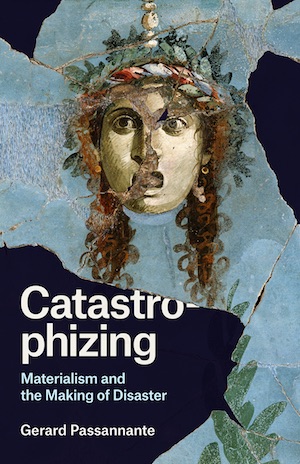By Louis J. Kern
This closely argued consideration of the response to classical philosophical materialism during the Renaissance and early scientific revolution delineates the crise de conscience of a select group of thinkers on the cusp of modernity who experienced profound doubt about empiricist hermeneutics. Natural phenomena (real and imagined) problematized the presumptive rationality of the universe—an imagined second global flood in the 1520s, the London fire (1666), consternated response to the (super)nova of 1572, and the eidetic/imaginary response to earthquakes and the Lisbon quake (1755). This work is part of the current Epicurean turn textually grounded in Lucretius Carus’ De rerum natura (49-50 BCE), embodying materialist atomic theory. Cf. Gerard Passannante’s The Lucretian Renaissance: Philology and the Afterlife of Tradition (2011), and Stephen Greenblatt’s The Swerve: How the World Became Modern (2011).
Considering a range of figures—Leonardo da Vinci, Thomas Digges, Robert Hooke, John Donne, William Shakespeare, and Immanuel Kant—Passannante delineates how discoveries revealed by microscopes, telescopes, and the fossil record ironically initiated uncertainty about cosmography grounded in the imperceptible realm of the universe postulated by Lucretius’ atomist ontology, viz. atoms as the smallest entities, ungenerated, eternal, indestructible, and universally constitutive, that operate through an unpredictable swerve (clinamin) in an environment of absolute void—“in infinito vacuo, ex fortuita atomorum collisione” (in an infinite vacuum [generated by] the accidental collision of atoms, Robert Burton, Anatomy of Melancholy, 1621).
This philosophical stance, both exhilarating and terrifying, undermined the unitary theory of divine creation and providence and the unique numinous quality of the soul. Materialist metaphysics both fascinated and repulsed, sparking “catastrophic materialism,” “an experience of the imperceptible mediated by the image of disaster.” Presurmising infinite worlds, early modern thinkers confronted Freud’s unheimliche (uncanny, terrifying), the abyssus abyssum invocat (Psalm 42:7); amid anxieties generated by catastrophic materialism “the image of disaster emerges . . . at the threshold between empirical and speculative forms of knowledge.”
While catastrophizing provided a pathway to the metaempirical, to “catastrophic relativism,” Passannante finds it less a formal philosophical position than an epistemological style, at once a source of exhilaration, dread, and doubt. As Poggio Bracciolini, who recovered (1417) the only extant ms of De rerum natura, put it, “we are terrified of future catastrophes and are thrown into a continuous state of misery and anxiety, and for fear of becoming miserable, we never cease to be so” (Letter to Niccolo Niccoli [transcriber of the text], May 18, 1416).
In a world with no firm boundary between astrology and astronomy, alchemy and science, even the best minds were subject to self doubt. Kant feared “to rave with reason,” distrusting the empty space of philosophical materialism as a solipsistic dream world. For Shakespeare, the quest for empirical knowledge might be found in the abyss, but the depths might prove to be unfathomable, only generating further uncertainty. Repurposing Aristotelian dialectic (Physics), he envisions the willful logic of quidlibet ex quolibet (any/everything from anything) as a potential source of disaster and ruin.
Concluding, Passannante reflects on the potential value of catastrophizing in relation to climate change, stressing the parameters of normal thought and inducing involuntary fantasies of disaster. Positing catastrophizing as useful in transforming the overwhelming and unthinkable into “affective experience,” he warns against apocalyptic, “bad” catastrophizing, rendering us helpless in the face of our fantasies of disaster. Interestingly, Climate activist NASA’s James Hansen has been styled a good “catastrophist” (The New Yorker, June 29, 2009).
Not a work for the casual reader, Catastrophizing will reward careful attention and thoughtful reflection and will appeal especially to historians of ideas, philosophers, students of the transition to modernity, and cultural theorists.
Louis J. Kern (ΦBK, Clark University) is professor emeritus of history at Hofstra University. Hofstra University is home to the Omega of New York chapter of Phi Beta Kappa.




